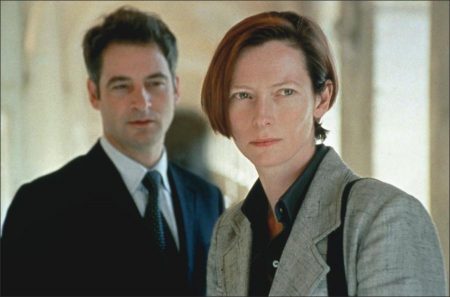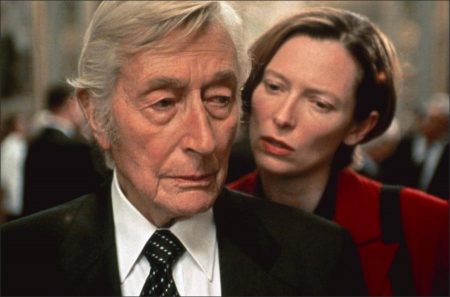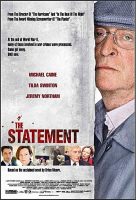The Statement movie storyline. Set in modern day France, the story of Pierre Brossard who, as a young man, was a Nazi executioner under the Vichy regime. Brossard has never been brought to trial and has lived a peaceful and anonymous life, sheltered by right-wing elements within the Catholic Church. A new investigation into his crimes is launched and Brossard finds himself the target of hit men on the one hand–and police investigators on the other. A wily old fox, he keeps outwitting his pursuers while desperately trying to figure out who they are. Who will get to Brossard first? The investigators or the assassins?
The Statement is a 2003 drama film directed by Norman Jewison and starring Michael Caine. It is based on a 1996 novel by Brian Moore, and the screenplay was written by Ronald Harwood. The Statement is the most recent film directed by Norman Jewison and starring Michael Caine, Tilda Swinton, Alan Bates, Jeremy Northam, Charlotte Rampling, John Neville, Ciarán Hinds, Frank Finlay, Matt Craven and Noam Jenkins.
The Statement is based on the best-selling 1995 novel of the same name by Brian Moore. In the novel and film, the fictional Brossard is based on Paul Touvier, a member of the Milice, a paramilitary police force of the Vichy French regime during World War II who ordered the execution of seven Jews in 1944. After the war, he was convicted of treason and sentenced to death in absentia, but with the aid of right-wing Roman Catholic clergymen, who provided him refuge in safe houses and monasteries, Touvier avoided capture. He received a controversial pardon from the President of France, Georges Pompidou, in 1971, but remained on the run. Unlike Brossard, Touvier finally was arrested in 1989 on a new charge of crimes against humanity; tried, convicted, and sentenced to life in prison, he died in jail in 1996.
Film Review for The Statement
A cat-and-mouse thriller with delusions of grandeur, ”The Statement” arrives wrapped in an intimidating mystique of high-minded solemnity that makes its vagueness and incoherence all the more disappointing when the pieces don’t add up. Adapted by Ronald Harwood (the screenwriter for ”The Pianist”) from Brian Moore’s best-selling novel and directed by Norman Jewison (”The Hurricane”), the movie has a blue-ribbon cast led by Michael Caine, Tilda Swinton and Jeremy Northam. Charlotte Rampling and Alan Bates put in cameo appearances.
As much as these wonderful actors invest their performances with psychological nuance, their efforts go mostly for naught in a movie that gives character development a distant back seat to the grinding mechanics of its formulaic plot.
Contributing to the movie’s air of self-importance is its grounding in true events. Moore’s novel was inspired by the life of Paul Touvier, an officer in the French Milice, the Gestapo-like police force of the Vichy government. Among Touvier’s crimes was his ordering the execution of seven Jewish hostages in June 1944.
Convicted of treason and sentenced to death in absentia after the war, Touvier eluded capture with the help of a group of right-wing Roman Catholic priests, who provided him with money and false identification papers and sheltered him in various safe houses, including several monasteries. His pardon in 1971 by the French president, Georges Pompidou, set off a public outcry.
Because the executions he had supervised qualified as crimes against humanity, Touvier remained on the run until 1989, when he was rearrested, tried, convicted and sentenced to life in prison. He died in jail in 1996. In the book and the movie, Touvier has been renamed Pierre Brossard, and his fate has been changed.
A sad measure of the film’s lack of vision is that Mr. Caine, who plays Brossard, cannot reconcile the contradictions of his character as it is written, despite his heroic efforts. The English star, now in the dazzling Indian summer of his career, stretches himself to the emotional breaking point with a risky, chafing performance that seesaws wildly between monstrosity and pathos.
Although Brossard is presented as a morally self-aware figure torn between his bleeding conscience and his brutish survival instinct, the swings from one to the other are absurdly abrupt. One minute Brossard is a weepy, guilt-stricken old man, groveling on his knees for divine forgiveness. The next he is a cunning, coldblooded killer who, in the movie’s most preposterous moment, threatens to murder the beloved pet dog of his estranged wife, Nicole (Ms. Rampling), if she refuses to help him.
The movie opens with a black-and-white flashback to the executions (a scene that is repeated far too many times), then jumps forward to 1992, when a headstrong young judge, Annemarie Livi (Ms. Swinton), initiates a new investigation of Brossard. Aided by Colonel Roux (Mr. Northam), an army officer, she is determined to rein in Brossard once and for all and at the same time to expose the Roman Catholic Church as his accomplice. More than one person warns her of dire personal consequences if she pursues her case.
Instead of seriously addressing the issue of the conservative Catholic complicity with Nazism (the Roman Catholic Church viewed Communism as a much greater threat than Hitler), the screenplay is content to skirt any serious controversy by reducing the drama to a prolonged, largely suspense-free manhunt, in which Brossard scurries like a weary hunted animal from one monastery to the next as the net closes around him. The obvious echoes of ”The Pianist” seem purely intentional.
The movie, which opens today in New York and Los Angeles, tosses in a second mystery that also generates little suspense. Just as the investigation has gotten under way, Brossard is tracked down by a would-be assassin later identified as David Manenbaum (Matt Craven) and shoots him first, then dumps his car into a ravine. That assassin, who turns out to be Canadian and not Jewish, belongs to a mysterious organization bent on killing Brossard and planting a statement of vengeance on his body. The movie halfheartedly tries to pump some excitement into the race between the law and the assassins to get to Brossard first.
Ms. Swinton, ashen and stiffly backboned, conveys a reckless moral fanaticism, but that’s the only trait we see. Mr. Northam’s ill-defined role is merely to be a calming influence. Ms. Rampling, though startlingly intense in her one scene with Mr. Caine, simply disappears thereafter. ”The Statement” ultimately doesn’t have the courage of whatever (presumably noble) convictions brought it into being.
The Statement (2003)
Directed by: Norman Jewison
Starring: Michael Caine, Tilda Swinton, Alan Bates, Jeremy Northam, Charlotte Rampling, John Neville, Ciarán Hinds, Frank Finlay, Matt Craven, Noam Jenkins
Screenplay by: Ronald Harwood
Production Design by: Jean Rabasse
Cinematography by: Kevin Jewison
Film Editing by: Andrew S. Eisens, Stephen E. Rivkin
Costume Design by: Carine Sarfati
Set Decoration by: Françoise Benoît-Fresco
Music by: Normand Corbeil
MPAA Rating: R for violence.
Distributed by: Sony Pictures Classics
Release Date: December 12, 2003
Views: 98





